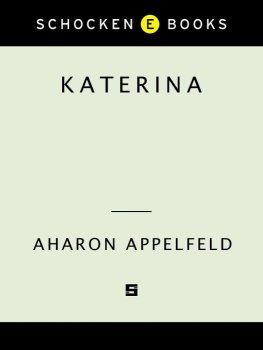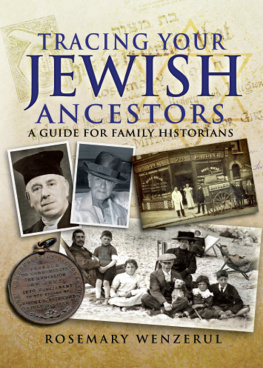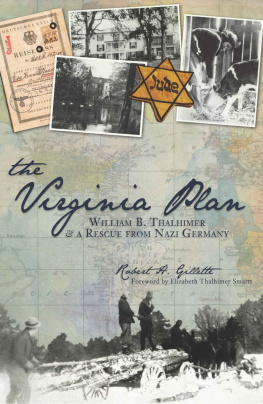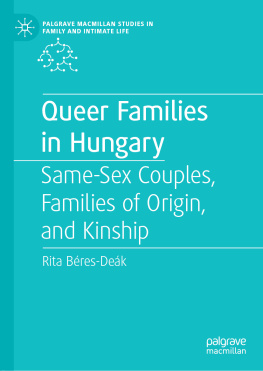First published 2009 by Transaction Publishers
Published 2017 by Routledge
2 Park Square, Milton Park, Abingdon, Oxon OX14 4RN
711 Third Avenue, New York, NY 10017, USA
Routledge is an imprint of the Taylor & Francis Group, an informa business
Copyright 1978, Mouton Publishers, The Hague, The Netherlands.
All rights reserved. No part of this book may be reprinted or reproduced or utilised in any form or by any electronic, mechanical, or other means, now known or hereafter invented, including photocopying and recording, or in any information storage or retrieval system, without permission in writing from the publishers.
Notice:
Product or corporate names may be trademarks or registered trademarks, and are used only for identification and explanation without intent to infringe.
Library of Congress Catalog Number: 2008060023
Library of Congress Cataloging-in-Publication Data
Mitchell, William E.
[Mishpokhe]
Kinship, ethnicity and voluntary associations: Jewish family life in
New York City/William E. Mitchell; preface to the paperback edition by
Walter P. Zenner; foreword by Marshall Sklare.
p. cm.
Includes bibliographical references and index.
ISBN 978-0-202-36301-1 (alk. paper)
1. Jews--New York (State)--New York--Societies, etc. 2. Jewish
families--New York (State)--New York--Societies, etc. 3. New York
(N.Y.)--Social life and customs. I. Title.
F128.9.J5M5 2008
306.8508992407471--dc22
2008060023
ISBN 13: 978-0-202-36301-1 (pbk)
Preface to the Paperback Edition
An increasingly rare event in the social sciences is the publication of a significant research monograph which can be read profitably by students and members of the general public alike. Mishpokhe is such a book. It is a contribution to several specialties within anthropology and sociology: urban studies, the family and kinship. Judaic studies, and voluntary organizations. There are several issues of great import for which this study serves as an apt illustration. The first and most central issue is the question of the role of kinship, especially those relatives who are not members of one's nuclear family, in modern societies. Morton Fried wrote of this in recommending this book:
If any demise has been announced more prematurely than that of "the family," it is the alleged passing of kinship as a basis for association in modern society. William Mitchell is modest enough to claim no predictive knowledge of the future with regard to the health of kinship in times yet to come, but his study of Jewish "cousin clubs," formed in what is sometimes referred to as the most urban city in the world, is stunning proof of the viability of kinship under the most atomizing circumstances. Indeed, it is not surprising that precisely the forces of social atomization produce a major stimulus for the active pursuit of extended relations of kin.
Mishpokke describes the continuation and development of such extended kinship through an unusual form of voluntary organizations.
Academic and popular sociology have both implied that kinship beyond the family has become irrelevant for modern people and that family life in cities is impoverished. In this view, whereas formerly people could rely on grandparents, siblings, and cousins, now they must derive their material and emotional satisfaction from the fragile nuclear family. There is a basis in experience for such generalization. Country-folk who come to the city find that they come from a place of kith and kin to one inhabited by strangers. In a highly mobile society one has only short-term relations with most people, who thus remain acquaintances rather than becoming life-long friends or kin. When one wants a job or a loan, one must seek out strangers. At the local supermarket, one no longer encounters familiar faces behind the cash register, but people who change from one week to the next.
But this is only one side of modern society. Upper class and elite solidarity appears to have some roots in kinship and deep friendships formed in prep schools, first-rate colleges, and exclusive clubs. In other classes, "the forces of social atomization," as Fried puts it, are themselves causes for finding refuges through the formation of close personal ties, including those of kind. Contact with kinfolk is one of these havens. People turn to their kin for credit, for influence in getting jobs, for information and advice, and for reconstructing their genealogies. In the process, they may run into difficulties. Mitchell and his colleague, Hope Leichter, reported on some of these problems in their book Kinship and Casework (N.Y.: Teachers College Press, 1978). For instance, family businesses among New York City Jews were often the sources of conflict within the family as emotional ties among relatives were strained by the economics of small enterprises. Still, ties with extended kin are strong. Not only family businesses and cousin clubs, but a whole variety of kin ties and assemblages are found in this community.
What Mitchell and Leichter found to be true in New York City has been found among other modern urban groups around the world. Even formal kin-based organizations comparable to the cousin clubs are present in Lebanon and among Overseas Chinese. Of course, in both cases the form is not identical to that of Jews in the United States.
The argument against the conventional view of the modern family can be attacked from another side, too. The weaknesses of the extensions of kin and family relations have been traced by historians back in time to the period before the Industrial Revolution. In Europe, for example, households tended to be small in pre-modern times. Thus, the presumed connection between the decline of the family and industrialization can be questioned.
In a less direct way, the family club phenomenon can be seen as an example of ethnic survival through cultural transformation. While ethnic groups often maintain their separate identity on the basis of particular cultural symbols, the nature of the cultural traits which define the group may change over time and in different places. Thus, certain foods and food habits may distinguish the group in one place and other food habits in another locale. To use Jews, the subjects of this book as an example, traditional European Jewry was distinguished by its disdain for non-kosher foods, especially pork, as well as a freer use of garlic and onions than was common among their European neighbors. Jewish neighborhoods in New York City and Chicago are often notable for having a large number of Chinese restaurants. This taste for Chinese food by non-orthodox Jews may be traced to maintaining a distaste for pork, except thoroughly disguised, plus a desire to follow the middle-class fashion of eating exotic foods.
The family clubs Mitchell discusses are also part of this process of acculturation which has marked Jews in America, especially New York City. For many, the most significant Jewish reference group has become the family. Those religious rituals which have become most central are connected to the family and kin, including Bar Mitzvahs, weddings, funerals, saying the Kaddish (a special prayer connected to mourning for a parent), exchanging presents at Hanukkah, and having a Seder meal on Passover, Even on Yom Kipper, the Day of Atonement, observed by more Jews than any other holiday, one finds the synagogue more crowded at the time of the Yizker (Memorial) prayer than at any other time of the day. In fact, for many Jewish-Americans religion and ethnic loyalty have been reduced to those customs revolving around the family. It is not surprising that such a "familistic" group should also produce formally organized family clubs.







